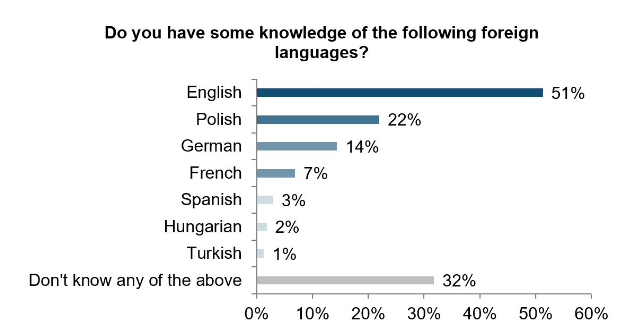
Ukraine has never really had a strong policy encouraging its people to learn English. Indeed, a recent survey by the Kyiv International Institute of Sociology revealed that only 23% of Ukrainians feel they have a professional level of English, and over a third have no knowledge of English at all.
But, that may be about to change. With the devastation that the war has caused, Ukraine is going to need some reconstruction money, and English is pretty important when it comes to attracting the West’s tourist dollars, investors, and international trade.
With Ukraine setting its sights on integrating into Europe and strengthening its relationships with the international community, it’s considering a new bill that pushes for English to become the language of international communication and a pre-requisite for jobs in the civil service, government administration, and law enforcement.
But, at the end of the day, policy isn’t the only hurdle for Ukrainians learning English, nor is it just our articles, or the way we pronounce things that cause confusion. There’s other stuff too:
Using complex sentences
In Ukrainian, you tend to use short, precise sentences, whereas our sentences tend to be longer, more complex, and tied together with all sorts of relative clauses and subordinating conjunctions.
For example: you might say, “Hello, my name is George. I live in Kiev. I work for a construction company.”
In English, we’d be more likely to combine those sentences into a single complex sentence, so we would say, “Hello, my name is George, and I live in Kiev where I work for a construction company.”
Rearranging words
Although your word order is similar to ours with a subject + verb + object pattern, your Ukrainian pattern is less firm. In other words, you can move new, or more important information, towards the front of the sentence.
For example, we could both say, “I’ll be home at 6pm.” But you, as a Ukrainian, could also say, “At 6pm, I’ll be home.”
Making tenses work
Another thing is that your tenses don’t work in quite the same way. You have three tenses – the present, past, and future, and none of them identify continuous actions. In English, we have 12 tenses that communicate not only the present, past, and future, but also whether the action is ongoing or routine, finished or unfinished, sequenced or one-off.
Using Adjectives
Our English Adjectives don’t change. We never adjust them to make them agree with the gender, number or case of the thing they describe. Your adjectives change to agree with the noun they describe. In other words, in English, we say, “one big cow or three big cows.”, whereas in Ukrainien, you would have “one big cow or three bigs cows.”
Dealing with phrasal verbs
Ukrainian is just as figurative as English, so you expect to see and hear idioms; however, phrasal verbs are a whole different story.
Prasal verbs are what we call combinations of verbs and prepositions or verbs and adverbs. Each combination creates a new meaning that you can’t guess from its components. Unless you know it’s a phrasal verb, understanding that new meaning can be very tricky.
For example, “Joe ate up the pie.” Without knowing that ‘eat up’ is a phrasal verb that means ‘finish’ it’s difficult to gain any meaning from the sentence. Similarly, “I hung up on my last caller because he was trying to sell me duct cleaning.” Without knowing that ‘hang up’ is a phrasal verb that means ‘end a phone call’, it’s almost impossible to get meaning out of this sentence.
Getting help
I’m not surprised if you, as a Ukrainian are having trouble learning English! If you need a little help, please get in touch with me by calling or texting 613-614-6460 or emailing andgela@ottawa-english.com
